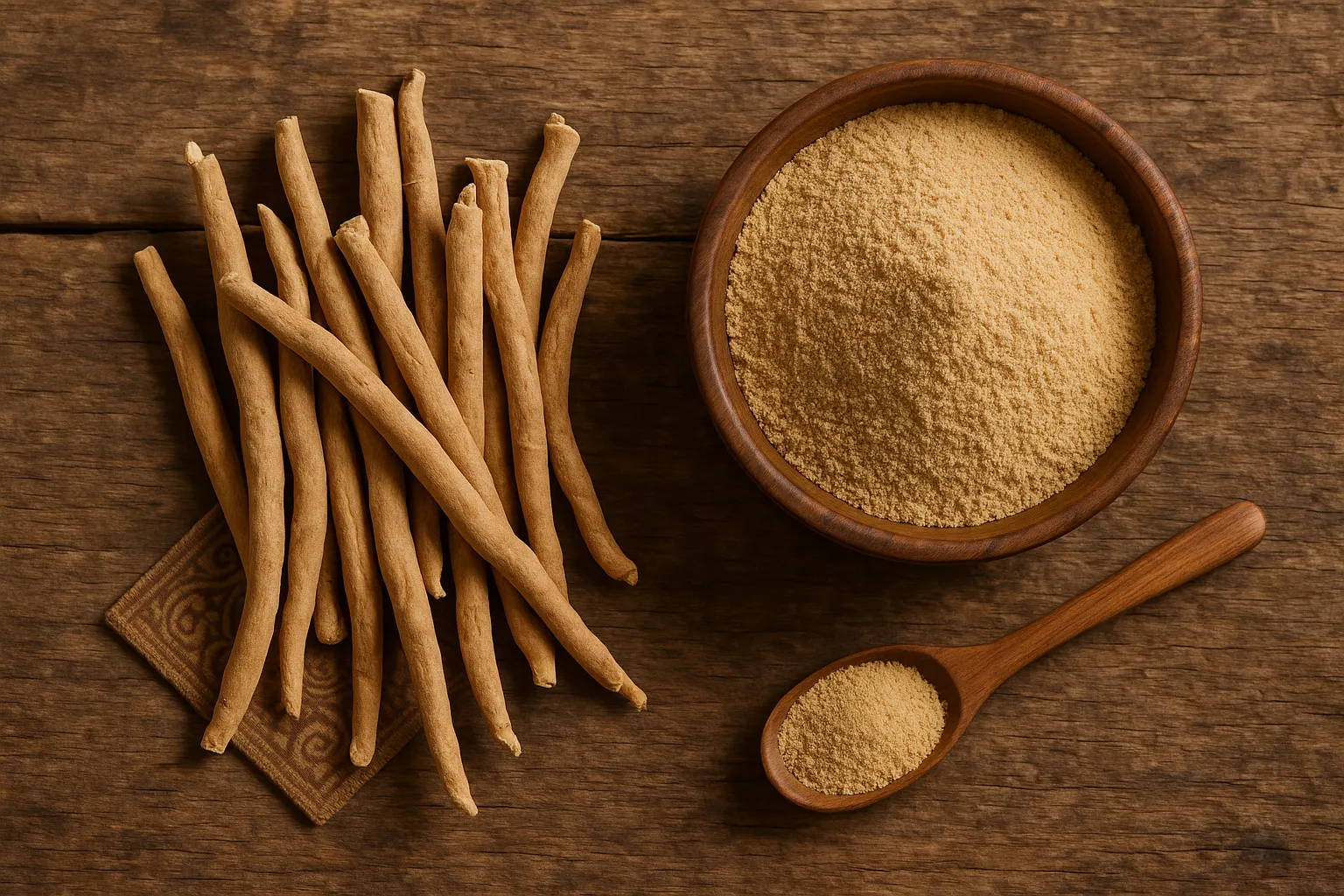Ashwagandha Nutrition Facts: Dosage, Benefits & Safety Guide
Ancient Ayurvedic adaptogen for stress relief and vitality—with science-backed benefits and important safety considerations.
Quick Nutrition Facts
Serving Size: 100g (root powder)
| Nutrient | Amount | % Daily Value |
|---|---|---|
| Calories | 245 kcal | 12.3% |
| Carbohydrates | 49.9g | 16.6% |
| Fiber | 32.3g | 129% |
| Protein | 3.7g | 7.4% |
| Fat | 0.3g | 0.5% |
| Iron | 3.5 mg | 19.4% |
| Calcium | 23 mg | 2.3% |
| Withanolides | 1.5-5g | - |
Typical Supplement Dose: 300-600mg extract (5% withanolides) = 15-30mg withanolides
Macronutrient Breakdown

NUTRITIONIST INSIGHT
Ashwagandha is an adaptogen herb traditionally used in Ayurveda for stress management. Studies show 300-600mg daily reduces cortisol and anxiety. However, liver injury cases have been reported, including rare fatal cases. Always start with the lowest effective dose (300mg) and monitor for symptoms like jaundice or dark urine. Consult a doctor if you have liver conditions or take medications.
Myth Busters
MYTH #1: Ashwagandha is safe for everyone because it's a natural herb
TRUTH: Natural doesn't mean safe. Ashwagandha can cause liver injury, with documented cases ranging from mild-to-moderate to fatal. A 2023 case report documented cholestatic liver damage with severe jaundice. Risk factors include high doses (>1,000mg/day), long-term use (>3 months), pre-existing liver conditions, and combining with other supplements or medications. Always consult a doctor before use, especially if you have liver disease, are pregnant/breastfeeding, or take medications.
MYTH #2: You need 1,000-2,000mg of ashwagandha for it to work
TRUTH: Clinical studies show 300-600mg of standardized extract (5% withanolides) is effective for stress, anxiety, and cortisol reduction. Higher doses (>1,000mg) increase side effect risks without significantly better benefits. Start with 300mg once daily and increase to 600mg only if needed after 2-4 weeks. Studies using 600mg/day found reduced serum cortisol without serious adverse effects in 8-12 week trials.
MYTH #3: All ashwagandha supplements are the same
TRUTH: Potency varies wildly. Key differences include:
- Withanolide content: 1.5-10% (standardized extracts are 5% minimum)
- Root vs. leaf: Roots have more withanolides; leaves may have different active compounds
- Extraction method: Water, alcohol, or dual extracts affect bioavailability
- Purity: Heavy metals, adulterants, or contamination risks
Look for supplements tested for safety (300-600mg extract, 5% withanolides) and third-party verified (USP, NSF, ConsumerLab). Avoid proprietary blends with undisclosed dosing.
MYTH #4: Ashwagandha works immediately for stress and anxiety
TRUTH: Benefits require consistent use for 2-4 weeks minimum. Studies show stress and anxiety reductions after 8-12 weeks of daily supplementation. Timeline:
- Stress/anxiety relief: 2-4 weeks
- Sleep improvements: 4-6 weeks
- Cortisol reduction: 6-8 weeks
- Athletic performance: 8-12 weeks
Ashwagandha is not a fast-acting anxiolytic (like benzodiazepines). It's a long-term adaptogen that supports stress resilience through hormonal and neurological changes.
MYTH #5: Ashwagandha boosts testosterone in everyone
TRUTH: Testosterone benefits are modest and primarily seen in men with fertility issues or high stress. Studies show testosterone increases in infertile men (10-15% increase), but healthy men see minimal changes (0-5%). Women may experience hormonal effects but shouldn't expect significant testosterone boosts. Ashwagandha's primary mechanism is cortisol reduction, which indirectly supports testosterone by lowering stress hormones—not direct hormone stimulation.
MYTH #6: You can take ashwagandha indefinitely without breaks
TRUTH: Long-term safety beyond 3 months is unclear. Most studies last 8-12 weeks. Cycling is recommended: Use 8-12 weeks, then take a 2-4 week break to prevent tolerance or liver stress. Monitor for side effects (digestive issues, drowsiness, jaundice). If taking longer than 3 months, consult a doctor and consider liver function tests (ALT, AST, bilirubin).
NutriScore by Health Goals
| Health Goal | NutriScore | Why This Score? |
|---|---|---|
| Stress/Anxiety |  | 600mg/day reduces serum cortisol and stress scores. Effective adaptogen for chronic stress. Start 300mg, increase to 600mg if needed. |
| Sleep Quality |  | May improve sleep latency and quality via cortisol reduction. Take 300mg 1-2 hours before bed. Effects noticeable after 4-6 weeks. |
| PCOS Management |  | May reduce cortisol and androgen levels in PCOS. Limited research; dosing unclear. Use cautiously with medical supervision. |
| Athletic Performance |  | Modest improvements in VO2 max, strength, and recovery. Effects seen after 8-12 weeks at 300-600mg daily. Best paired with training. |
| Weight Loss |  | May reduce stress eating via cortisol reduction. No direct fat-burning effect. Useful for stress-related overeating but not a weight loss supplement. |
| Diabetes Management |  | Limited evidence for blood sugar benefits. May indirectly help via stress reduction (chronic stress raises blood sugar). Not a diabetes treatment. |
PERSONALIZED NUTRITION
Track your meals with NutriScan for personalized NutriScores based on your specific health goals!
Cultural Significance
Ashwagandha (Withania somnifera), also known as "Indian ginseng" or "winter cherry," has been a cornerstone of Ayurvedic medicine for over 3,000 years, traditionally used as a "rasayana" (rejuvenative tonic) to promote longevity, vitality, and mental clarity.
In Ayurvedic Medicine:
- Dosha balance: Used to pacify Vata and Kapha doshas (anxiety, fatigue, inflammation)
- Traditional preparations: Root powder mixed with ghee, honey, or milk as a morning or evening tonic
- Sanskrit meaning: "Ashwa" (horse) + "gandha" (smell)—roots smell like horse sweat, symbolizing vitality and strength
- Rasayana therapy: Prescribed for chronic stress, insomnia, weak immunity, and premature aging
Modern Global Perspective:
- Market explosion: Global ashwagandha market valued at $600 million (2023), projected to reach $1.5 billion by 2030
- Western adoption: Widely used as a nootropic and adaptogen in stress management, fitness, and cognitive enhancement
- Clinical research: 500+ PubMed studies on ashwagandha, with growing evidence for stress, anxiety, and cortisol reduction
- Sustainability: Cultivated in India (Rajasthan, Gujarat), with organic farming gaining traction to meet global demand
Compare & Substitute
Ashwagandha vs Similar Adaptogen Herbs (Per 300mg Extract)
| Nutrient/Benefit | 🌿 Ashwagandha | 🌸 Rhodiola | 🌱 Holy Basil | 🌾 Ginseng |
|---|---|---|---|---|
| Active Compounds | Withanolides (15-30mg) | Rosavins, salidroside | Eugenol, ursolic acid | Ginsenosides |
| Primary Benefit | Stress, cortisol reduction | Fatigue, mental performance | Anxiety, inflammation | Energy, cognitive function |
| Onset Time | 2-4 weeks | 1-2 weeks | 1-2 weeks | 2-4 weeks |
| Dosage | 300-600mg | 200-600mg | 300-600mg | 200-400mg |
| Side Effects | Liver risk, drowsiness | Minimal (jitteriness rare) | Minimal (nausea rare) | Insomnia, blood pressure |
| Best For | Chronic stress, sleep, anxiety | Acute fatigue, mental fog | Anxiety, respiratory health | Energy, focus, libido |
Frequently Asked Questions
What is the correct dosage of ashwagandha?
300-600mg of standardized extract (5% withanolides) daily is effective for stress and anxiety. Studies using 300-600mg for 8-12 weeks show safety and efficacy. Start with 300mg once daily with meals; increase to 600mg after 2-4 weeks if needed. Doses above 1,000mg increase side effect risks. Timing: Stress/anxiety = morning or mid-day; Sleep = 1-2 hours before bed; Athletic performance = pre/post-workout.
Can ashwagandha damage the liver?
Yes, liver injury is possible. Cases range from mild-to-moderate to severe cholestatic hepatitis, including rare fatal cases. Risk factors: High doses (>1,000mg/day); long-term use (>3 months); pre-existing liver conditions; combining with other supplements/medications. Warning signs: Jaundice; dark urine; severe fatigue; abdominal pain; nausea. Stop immediately and consult a doctor if symptoms occur. Consider liver function tests (ALT, AST, bilirubin) before starting and after 8-12 weeks.
How long does it take for ashwagandha to work?
Benefits require consistent daily use: Stress/anxiety relief: 2-4 weeks; Sleep quality: 4-6 weeks; Cortisol reduction: 6-8 weeks; Athletic performance: 8-12 weeks; Testosterone (in men): 8-12 weeks (modest increases in infertile/high-stress men only). Important: Ashwagandha is not a fast-acting drug—it gradually modulates stress hormones (cortisol) and neurotransmitters (GABA, serotonin). Patience and consistency are key.
Is ashwagandha safe to take every day?
Yes, short-term (up to 3 months) at 300-600mg daily. Long-term safety beyond 3 months is unclear. Best practice: Use 8-12 week cycles, then take a 2-4 week break; monitor for digestive issues, drowsiness, or liver symptoms (jaundice, dark urine); consult a doctor if using >3 months. Avoid if: Pregnant/breastfeeding; autoimmune diseases; thyroid disorders; liver conditions.
Does ashwagandha interact with medications?
Yes, interactions possible with: Sedatives/CNS depressants (benzodiazepines, Ambien, alcohol)—risk of excessive drowsiness; Thyroid medications (levothyroxine)—may increase thyroid hormones (monitor TSH, T3, T4); Immunosuppressants (corticosteroids, cyclosporine)—may counteract effectiveness; Blood sugar medications (metformin, insulin)—risk of hypoglycemia (monitor closely); Blood pressure medications (ACE inhibitors, beta-blockers)—may cause excessive drops (monitor regularly). Always consult a doctor before combining ashwagandha with medications.
Can I take ashwagandha with other adaptogens?
Yes, with caution. Limited research on combination safety. Safe combinations: Ashwagandha + Rhodiola (300mg each) for energy/stress; Ashwagandha + Holy Basil (300mg each) for anxiety/inflammation; Ashwagandha + Lion's Mane (300mg + 500mg) for cognitive function. Risks: Additive liver stress; unknown herb-herb interactions; excessive sedation. Best practice: Start with one adaptogen for 4-6 weeks before adding a second; avoid stacking >3 simultaneously; consider liver function tests if using multiple long-term.
 ChatGPT
ChatGPT  Claude
Claude  AI Mode
AI Mode  Perplexity
Perplexity 



